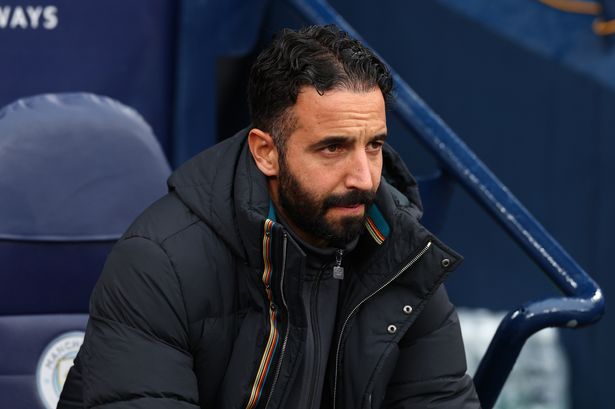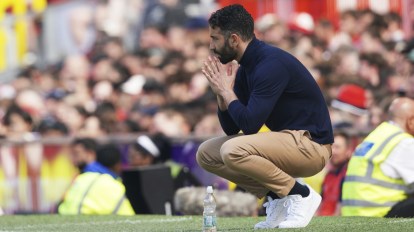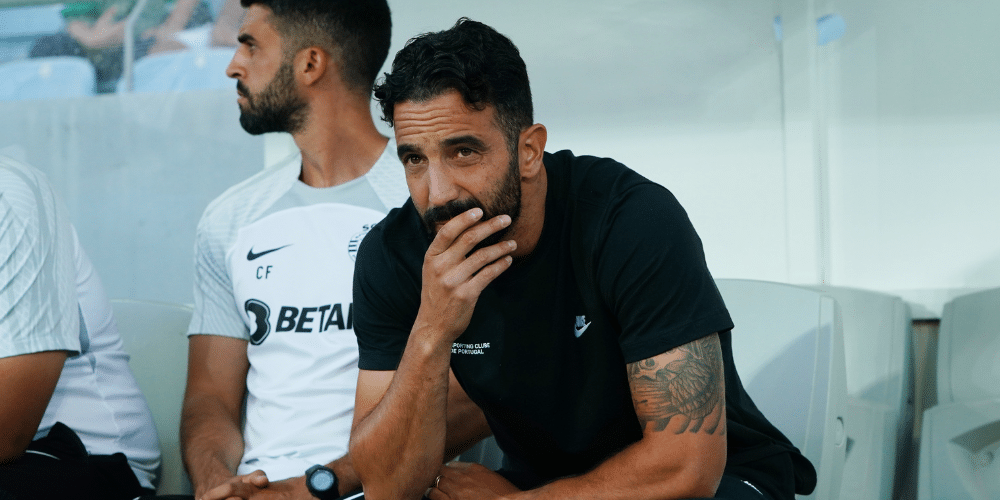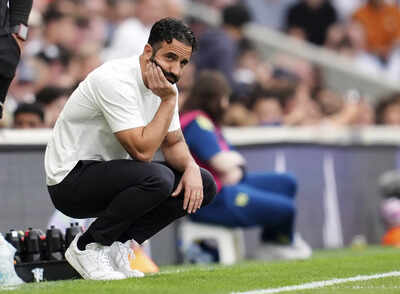In the realm of modern football, Ruben Amorim has emerged as a tactician admired and scrutinized in equal measure. His recent performances at Manchester United have sparked widespread debates about his coaching philosophy, strategic adaptability, and the future of his tenure, especially after a devastating derby defeat. This article delves into Ruben Amorim’s evolving managerial journey, the current state of Manchester United, the key moments from the derby, and what lies ahead for both the coach and the club.
More Ruben Amorim – Redefining Manchester United’s Future with Innovative Tactics 2025
Introduction to Ruben Amorim

Background and Early Career
Ruben Amorim was born in Lisbon, Portugal, and initially built his reputation as a talented midfielder before transitioning into coaching. His playing career included notable stints at Sporting Lisbon and other Portuguese clubs, where he showcased potential but perhaps not as an elite player. Yet, his football intelligence was apparent early on, setting the stage for his move into management.
Amorim’s early coaching career began at Braga, where he impressed with his tactical discipline and innovative approach, quickly earning recognition in Portuguese football. The focus on developing young talent and playing forward-thinking, aggressive football helped him stand out among emerging coaches. His reputation grew, leading directly to his appointment at Sporting Lisbon—the club where he would cement his legacy.
Transition to Coaching
Amorim’s transition from player to coach was marked by persistence and strategic insight. Known for his intense preparation and attention to detail, he quickly established a reputation for tactical flexibility, often incorporating advanced data analysis and modern training methods. His coaching style stands out for its emphasis on possession-based football combined with quick transitions, making teams he manages unpredictable and tactically challenging.
His approach also reflects a philosophical belief in nurturing a strong team identity and mental resilience. This foundation helped him succeed at Sporting Lisbon, where he cultivated a young squad capable of competing against bigger clubs, earning domestic trophies and critical acclaim. Teams under Amorim become not only tactically organized but also confident and well-drilled.
Success at Sporting Lisbon
Ruben Amorim’s tenure at Sporting Lisbon marked a period of significant achievement. Under his leadership, the club clinched the Portuguese Primeira Liga title, breaking the hegemonic dominance of Benfica and Porto. His tactical flexibility, balancing attacking flair with defensive solidity, earned admiration across European circles.
His success was characterized by a pragmatic yet bold style of play, with fluid formations and dynamic pressing. The development of young players and tactical discipline—especially in high-stakes matches—showed his potential to lead bigger clubs and even national teams. This success was a pivotal chapter, attracting clubs outside Portugal, ultimately paving his way to a marquee managerial role that now includes stepping into the English Premier League.
Overview of Manchester United’s Current State

Recent Performance Analysis
Manchester United finds itself at a crossroads. The club’s recent performances have been inconsistent, with tactical confusion, defensive lapses, and a lack of cohesive attacking strategies hampering progress. Under new management, there have been flashes of brilliance but also periods of disarray, signaling the need for a clear direction.
While the squad boasts talented individuals, it struggles with cohesion and tactical discipline—issues that Ruben Amorim would need to address if he were to take charge. The club’s ambition to return to its former glory remains unfulfilled, with a growing impatience among supporters and pundits alike for immediate results combined with sustainable progress.
Key Matches and Results
Recent pivotal fixtures—such as losses to top-tier rivals—highlight the squad’s struggles. Perhaps most notably, the recent Manchester Derby showcased the deep-rooted issues within the team, as City dominated proceedings in a 3-0 victory. Such results cast a shadow of doubt over whether current strategies are effective or whether new leadership is needed.
The club’s inability to mount a strong response after conceding early often reflects issues in tactical planning and adaptability. These moments underscore the urgency for a manager like Ruben Amorim, whose tactical agility could unlock the team’s potential and instill a winning mentality amid mounting pressure.
Comparison with Rivals
Against rivals, Manchester United’s performance has often been lackluster, especially when compared with the tactical organization and fluid attacking setups of Manchester City or Liverpool. Their inability to match the tactical prowess of opposition managers exposes vulnerabilities, which have been exploited in recent high-stakes encounters.
Of course, comparisons are not solely about results but also about philosophy. Ruben Amorim’s approach—if incorporated—could introduce a new level of tactical sophistication, but only if the club’s infrastructure aligns with such a vision. The current state makes the urgency for strategic overhaul evident, with fans lauding a fresh approach that could revive the club’s fortunes.
The Manchester Derby: A Case Study

Match Highlights and Key Moments
The recent derby was a microcosm of Manchester United’s ongoing struggles. Manchester City, under their manager, showcased clinical precision, dominating possession and creating numerous goal-scoring opportunities. Key moments included a commendable debut from Jan Luji Donaruma, who made several vital saves, and a brace from Erling Haaland, reaffirming his role as one of the world’s most lethal strikers.
Phil Foden’s opening goal exemplified Manchester City’s fluid attacking movement, while Haaland’s persistence and positioning created multiple threats. The defensive lapses and lack of tactical adjustments by United further highlighted systemic flaws that need to be addressed. This match was not just a defeat but an illustration of the tactical gap that Ruben Amorim might bridge with fresh ideas.
Tactical Approach by Ruben Amorim
Ruben Amorim’s tactical philosophy revolves around positional flexibility, quick transitions, and high-intensity pressing—principles that could challenge Manchester City’s dominance. His setups at Sporting Lisbon often involved fluid formations, shifting seamlessly between 3-4-3 and 4-2-3-1, depending on the match context, emphasizing ball recovery and counterattacking.
Applying this approach against Manchester City’s ball dominance would require disciplined pressing and positional awareness. Amorim would likely prioritize controlling space and disrupting the opposition’s rhythm—a stark contrast to the static and cautious approach seen from United during the derby. His ability to adapt tactically during ongoing matches could provide United with the resilience needed to compete at the highest level.
Critique of Player Performances
The derby highlighted specific player deficiencies, most notably within Manchester United’s midfield. Bruno Fernandes, the team’s creative hub, was notably ineffective, struggling with communication and controlling tempo. Defensive lapses, especially in the channels occupied by aging defenders, further exposed United’s vulnerabilities.
Some players appeared mentally overwhelmed, emphasizing the importance of leadership and tactical clarity. Ruben Amorim’s philosophy includes empowering players with positional discipline and tactical clarity—traits that United desperately need to improve their on-field organization and morale.
Bruno Fernandes: Central to United’s Struggles

Overview of Fernandes’ Role
As United’s creative spark and set-piece specialist, Bruno Fernandes occupies a pivotal role. However, recent performances suggest a disconnect between his potential and actual influence. Under pressure, his decision-making has become erratic, and his defensive duties have been insufficient.
Fernandes’s role demands leadership and tactical awareness; deficiencies here have become painfully apparent in crucial matches. He epitomizes the broader issues of communication and system coherence within the team, which are areas Ruben Amorim excels in addressing.
Communication Issues in Midfield
The Manchester derby exposed stark communication failures in United’s midfield. Players often appeared disconnected, leading to tactical breakdowns and dangerous counterattacks. Fernandes’s inability to effectively marshal his teammates reflects deeper issues in team cohesion and tactical training.
Addressing such communication gaps would require consistent coaching, clear tactical instructions, and player leadership—elements that Ruben Amorim could emphasize with his focus on clarity, discipline, and team unity, transforming raw talent into a cohesive unit.
Potential Solutions for Improvement
To overcome these issues, United must foster better communication, improve positional awareness, and develop midfield stability. Implementing structured drills and tactical discipline similar to Amorim’s methods could benefit the team both creatively and defensively.
Long-term, building a squad that understands its tactical identity—along with cultivating leadership—will be crucial. This aligns with Amorim’s developmental philosophy, which champions tactical clarity and mental resilience to turn around underperforming sides.
Tactical Adjustments and Game Management

Amorim’s Tactical Philosophy
Ruben Amorim’s teams are renowned for their tactical fluidity and high-intensity pressing systems. His philosophy emphasizes controlling the game through mobile formations, quick transitions, and adaptable pressing schemes designed to unsettle opponents. Such tactics demand discipline but offer the reward of exploiting spaces and dominating possession.
If United adopts these principles, they could better capitalize on their attacking talent while shoring up defensive lapses. Amorim’s ability to read the game and make quick adjustments is key to overcoming strong opposition—a skill that United sorely needs.
The Need for Quick Adaptations
Derby matches often hinge on tactical flexibility. The failure to swiftly alter game plans or respond to threats was evident in the recent encounter. Amorim’s teams excel in making timely substitutions and positional shifts, which could be a game-changer for a struggling United side.
In high-pressure contexts, players need clear guidance and adaptable strategies. The capacity for a manager to reframe tactics dynamically is vital, especially if United aims to challenge top-tier rivals consistently. This need for agility underscores why Ruben Amorim’s tactical mindset is appealing and essential for United’s evolution.
Lessons from the Derby Performance
Manchester United’s performance in the derby reveals crucial areas for improvement—from defensive organization to midfield control. The lack of tactical adjustments and poor communication contributed to a comprehensive defeat.
Learning from these mistakes involves instilling a disciplined tactical approach, emphasizing positional awareness, and building mental toughness. Amorim’s focus on adaptability and structured play could provide the blueprint for transforming United into a more resilient and strategically sophisticated team.
Analyzing Haaland’s Dominance

Impact on Manchester City’s Performance
Erling Haaland’s goal-scoring prowess has revolutionized Manchester City’s attack. His physical presence, precise positioning, and clinical finishing made him the stand-out player in the derby, ultimately securing City’s commanding victory.
His performance underscores the importance of having a prolific striker who can capitalize on limited chances. City’s tactical setup, which creates space for Haaland through systemic movement, exemplifies high-level attacking football—something United desperately tries to emulate.
Lessons for United’s Defensive Strategy
United’s defensive vulnerabilities were highlighted by Haaland’s positioning and his ability to find the net despite tight marking. For Ruben Amorim, it’s a lesson that defensive organization is critical against top-tier attackers.
To counter such players, a disciplined backline with clear communication and strategic pressing is essential. Implementing tactical elements like zonal marking and coordinated pressing could mitigate the threat posed by prolific strikers and prevent similar routs in future matches.
Importance of Competitive Strikers
Haaland’s dominance accentuates the need for United to develop or acquire comparable goal scorers. The club’s long-term success hinges not just on tactical systems but also on recruiting frontline talent capable of decisive moments.
Building a squad with versatile, goal-hungry strikers, coupled with intelligent supply chains orchestrated by a strategic midfield, is indispensable. This lesson from the derby is an impetus for United to prioritize attacking reinforcements and tactical refinement.
Future Strategies for Manchester United
Addressing Tactical Predictability
United’s struggles often stem from predictable gameplay and a lack of tactical variety. Opponents exploit these tendencies to stifle creativity and dominate possession.
To change this, the club must embrace innovative, adaptable strategies—possibly by adopting principles similar to Ruben Amorim, who emphasizes positional fluidity and quick tactical shifts. Diversifying offensive and defensive approaches will make United less predictable and more resilient.
Developing Ball Control and Midfield Organization
Improving ball retention and mid-field organization is crucial. The derby exposed a lack of composure and control in midfield, leading to turnovers and defensive instability. Training methods that focus on positional discipline, tabletop drills, and tactical awareness could enhance overall performance.
The recruitment of disciplined midfielders and fostering a culture of precise communication are key. Long-term, such strategies can create a more balanced team—better equipped to maintain possession and dictate play.
Long-term Vision for Club Growth
Stability in coaching and clear long-term planning are vital. While quick fixes may yield short-term gains, sustainable success depends on consistent philosophy, player development, and infrastructural investment. Ruben Amorim’s approach, emphasizing tactical flexibility and youth integration, aligns with such a vision.
The club must lay down a structured plan that balances immediate results with the development of a culturally cohesive and tactically sophisticated team—building Manchester United into a force that can challenge domestically and in Europe.
The Controversy of Amorim’s Position
Criticism from Fans and Pundits
Despite his accomplishments, Ruben Amorim faces skepticism, particularly regarding his experience managing in top leagues and the ability to handle the pressures at Manchester United. Critics argue that his success in Portugal doesn’t automatically translate to the Premier League’s intensity and defensive demands.
Fans and pundits alike voice concerns about whether the club’s environment can sustain a young coach’s philosophy or if it might lead to instability. The debate underscores the importance of considering managerial stability amid lofty ambitions.
Evaluating Potential Replacement Options
If Ruben Amorim’s tactics or personality clashes with club expectations, alternative candidates emerge—seasoned managers with proven Premier League records or experienced tacticians with a more pragmatic approach.
However, such shifts increase risks, as frequent managerial changes destabilize club progress. Striking a balance between innovation and stability is critical when evaluating Amorim’s potential as Manchester United’s future coach.
The Importance of Stability in Coaching
A club with a rich history like United values patience and long-term vision. If Ruben Amorim is to succeed, he must foster a culture of stability, trusting the club’s infrastructure and aligning tactical shifts with club philosophy.
Management must weigh the benefits of strategic continuity against immediate results. Proper support and clear communication can help maximize the potential of Amorim’s tactical philosophy—integrating modern football principles with the club’s traditions.
The Role of Club Management in Coaching Decisions
Factors Influencing Managerial Stability
Success at Manchester United depends not only on the coach but also on club management’s ability to provide perfect support. Factors such as transfer policies, infrastructural investments, and internal communication all influence a manager’s tenure.
Furthermore, aligning long-term club vision with the coach’s tactical ideology ensures a harmonious working relationship. Management must assess Amorim’s fit for such a project to prevent unnecessary upheaval.
The Need for Long-term Planning
A clear roadmap for rebuilding Manchester United, emphasizing youth development and tactical evolution, is vital. Relying solely on short-term results can jeopardize stability, especially given the club’s ambitions on European and domestic fronts.
Ruben Amorim’s youth-focused approach complements such planning, offering the potential for sustainable growth if given time and support.
Balancing Immediate Results with Future Development
Achieving immediate success often conflicts with long-term goals. Management’s challenge is to navigate this delicate balance, maintaining patience while striving for excellence.
For Ruben Amorim, this balance involves trusting a developmental process—implementing tactical innovations, nurturing youth, and establishing a resilient identity that can stand the test of time.
Notes
Key Takeaways from the Manchester Derby
The derby exposed Manchester United’s tactical vulnerabilities, communication gaps, and defensive frailties. City’s dominance, especially through Haaland, underscored the necessity for strategic upgrades, both in management and squad depth. The performance not only reflected current weaknesses but also highlighted potential areas where Ruben Amorim’s tactical acumen could transform the team.
Summary of Expert Opinions
Football analysts recognize Amorim’s innovative approach but caution about adapting to the Premier League’s hard-edged nature. Experts agree that his emphasis on tactical fluidity and youth development could be a long-term asset but require patience and proper institutional backing. The consensus suggests a need for managerial stability and strategic recruitment akin to his coaching philosophy.
Mistakes to Avoid
Underestimating Tactical Adaptation
Clinging to outdated systems or resisting tactical evolution can lead to further decline. Manchester United must prioritize flexibility, drawing lessons from Ruben Amorim’s adaptable strategies, especially when facing tactically disciplined opponents.
Overlooking Player Communication Dynamics
Ineffective communication hampers team cohesion. Strengthening leadership within the squad, and providing clear tactical instructions, are vital—areas in which Amorim’s emphasis on discipline and clarity can be highly effective.
Neglecting Defensive Strategies Against Top Teams
The derby reinforced the importance of solid defensive organization. Clubs must invest in tactical training that enhances positional awareness and team shape, critical components to contain top attackers like Haaland.
Frequently Asked Questions
What expectations should be set for Amorim at Manchester United?
Fans and club stakeholders should recognize that Ruben Amorim is a coach who prioritizes tactical innovation, youth development, and long-term growth. Immediate trophies may not be realistic, but steady progress and the development of a resilient, exciting team should be the core expectations during his tenure.
How can United improve under Amorim’s management?
Improvements can come through tactical discipline, better communication, and strategic recruitment aligned with his vision. Embracing Amorim’s flexible playing style, combined with infrastructural support, will be crucial in elevating United’s performance over time.
What are the signs that a manager needs to be replaced?
Persistent tactical stagnation, inability to adapt to opponents, communication failures, declining player morale, and a lack of progress are common indicators. For Ruben Amorim, if the team shows signs of regression despite investment and support, the club must reassess strategies to prevent long-term decline.
Conclusion
The recent Manchester Derby illuminated crucial tactical and structural issues at Manchester United, casting doubt on their ability to compete at the highest level without strategic reforms. Ruben Amorim, with his innovative tactical philosophy and track record of developing cohesive, agile teams, presents a compelling candidate for United’s future, but only if the club commits to stability and long-term planning. His potential appointment signifies a desire for a fresh, adaptable approach—one that could transform United into a resilient, attacking powerhouse. However, this journey demands patience, tactical discipline, and unwavering support from club management to turn aspirations into sustainable success in the fiercely competitive landscape of modern football.

